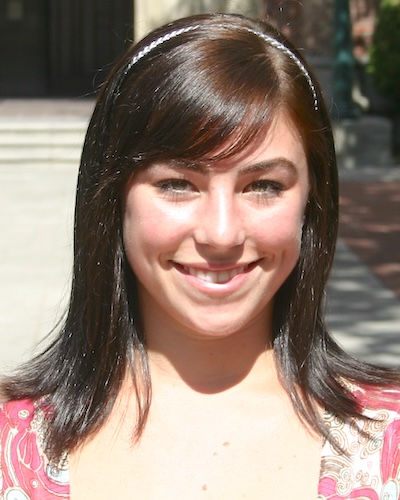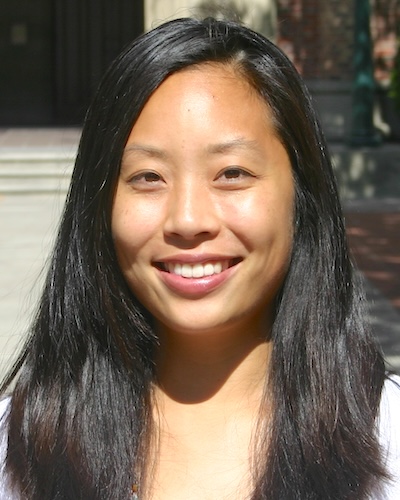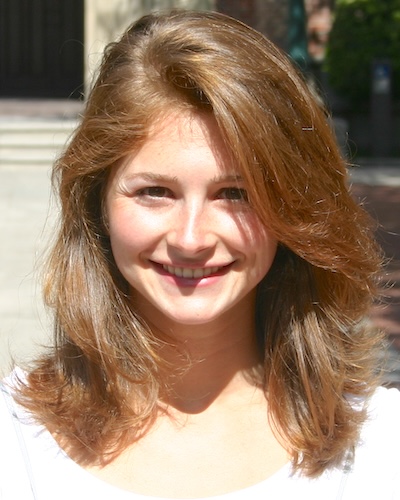Student Blog
Classes

A chance to be the client and clinician ⟩
February 23, 2011, by Austen
Classes What are OS/OT?
One of the electives I chose to take this semester is Lifestyle Redesign. This class is taught by Dr. Camille Dieterle of the USC Faculty Practice for Lifestyle Redesign. Some of the topics we are learning about include the foundation of this practice area, the populations that benefit, the programs offered at the USC Faculty Practice, ways to develop programs and modules, and methods for helping people establish a healthier lifestyle.
A large portion of the class includes role-playing with a partner, taking turns playing the parts of the client and the clinician. We work in our “diads” to practice self-reflection and analysis, goal-setting, problem solving, and solution generation on each other. While one person acts as the client and identifies complaints, areas for improvement, things they would like to change, and/or what their goals are, the other person acts as the clinician, helping identify outcomes to work towards, possible solutions to get there, and ultimately collaboratively establishing an action plan with the client. This role-playing aspect of the class has been the most valuable to me so far. I am learning to communicate effectively in the clinician role, asking open-ended questions, avoiding judgement, and using non-directive comments. It is very challenging to not give advice when that may be what someone is looking for, but we are learning more effective ways of empowering the client so that they can reach their own solutions.
Not only am I learning skills I will use in the workplace next year, but I am also getting a lot out of being the client during our one-on-one sessions. I have learned a lot about myself, what is bothering me that I may not have been aware of, what I want, and what I want to change. It has been a great opportunity for self analysis and reflection, allowing me to identify aspects of my life that could be improved. In essence, it has been like free therapy. What a bonus!
This class has already equipped me with effective communication skills that I will be able to use in practice, no matter what setting. I have many more “tools” to add to my bag of tricks as a soon-to-be clinician, which makes me feel more confident and excited. When looking at the elective courses available, I highly recommend this one!
⋯

M.I. ⟩
February 15, 2011, by Yao
Classes School/Life Balance What are OS/OT?
A great opportunity and a blessing in disguise.
I just finished my first session and am about to start working on the homework for my second session of Motivational Interviewing. Motivational Interviewing is an elective class that is offered the spring semester over three Saturdays with days starting at 9am and scheduled to end around 4pm. I originally elected to take the class not only because one of my favorite professors was teaching it but also because it was a method that I planned to use in my research project. I went into class that first Saturday with the mindset of just learning a clinical skill and perfecting and perfecting until I felt that I had it right. Boy did I have the wrong idea!
The day started off with the basics and the history behind motivational interviewing and some video examples of practitioners incorporating it into practice. Then it came time to practice. Like I had mentioned before it was not a skill that should just be learned cold and practiced numerous times, rather it’s a skill that you need to feel and experience. This feeling and experience will guide your use of the skill, a real feeling and investment in the person that you’re talking to. To me it’s not a skill that you can just practice with a partner and in the middle ask if you’re doing it right, but something that when given the opportunity should be used to help fully understand the origin of certain actions and feelings. And as my professor mentioned, “If you do it well, people won’t even know it”; not to echo what I mentioned in my previous entry but sometimes listening can bring about more answers and chances for change than automatically trying to fix the problem as soon as you hear one.
On another note this motivational interviewing class has allowed me to tap into my emotions for the first time in about a year and a half. When things happened over these past two years that required emotional investment I tended to push them aside because there was that ever present need to do well in school and live in the moment with school and my social life here in Los Angeles. I was surprised at how I felt, not to say that there was a huge revelation and that I was denying my feelings these past two years. But I was able to identify emotions and feelings that I thought I have overcome or had just died down over the past years. I’m looking forward to the second session to further explore these feelings and try and resolve them instead of just pushing them aside and making school the excuse for not addressing them. It’s a nice complement to the other coursework this semester. It also is a reminder that no matter what is going on you have to consider taking care of yourself so you can provide your best care to others.
⋯

Supporting Coursework ⟩
January 31, 2011, by Amanda
Classes What are OS/OT?
To complement the clinical coursework, there are a few classes that enhance your ability to understand client needs and address them from an occupational science perspective.
Throughout the clinical coursework, there is supporting coursework to enhance your understanding of occupation and multiple dimensions of practice. To begin, there is a medical lecture component to your coursework, the purpose of which is to introduce students to varying diagnoses and conditions. Guest lecturers that specialize in working with various populations are the ones delivering the course content. The information from this course serves as a great reference. As an entry-level practitioner you are faced with so many new populations and your notes from school are something you will return to refresh your understanding and knowledge of the details of the conditions you see in practice. What I also found fascinating was when a professional from another discipline presented his or her perspective of a diagnosis. For example, there was a bariatric surgeon presented on obesity. From his professional perspective, bariatric surgery was the answer to the obesity and type II diabetes epidemic. This compares with the occupational science and therapy perspective that would intervene through understanding an individual’s occupational habits, roles, and routines and develop strategies to address the chronic weight management issues that the individual faces. Both interventions require major lifestyle changes, depending on the individual, one, the other, or both interventions may be appropriate. From these lectures, you begin to build your sense of how OT would approach a condition compared to another professional. You see how important the OT perspective is in healthcare.
Occupational science is an academic discipline devoted to the systematic study of the form, function and meaning of occupation. USC’s Division of Occupational Science and Occupational Therapy is committed to understanding the human experience of occupation in order to apply that understanding to the practice of occupational therapy. Coursework in occupational science is part of the curriculum for occupational therapy students at USC. Students explore the various dimensions and interdisciplinary knowledge that underlie occupation. Topics include how routines, habits, culture, environment and preferences contribute to health and well-being. Guest lecturers present how they have taken concepts from occupational science and developed programs that increase well-being, such as in the programs at the USC Faculty practice and in the Well-Elderly Study. As a student, you begin to see occupation through different lenses and how to identify supports and barriers to occupation. The study of occupational science informs occupational therapy practice through asking how we may best understand and enable occupational performance.
The Skills for Occupational Therapy coursework that I previously wrote about in a blog post continues in the subsequent semesters. You expand your knowledge from analyzing tasks to understanding the therapeutic relationship and how to design occupation-centered programs. I found that these classes gave a space for discussing the tough issues you may see in practice. We explored our strengths and weaknesses in terms of building relationships and how we may best serve clients therapeutically. As a therapist you are not only providing an intervention, but you are using the relationship with the client to see successful outcomes. We also had the time to discuss what we were seeing in our level I fieldworks: what we liked and what we didn’t like. Based on what I saw in fieldworks and from discussions in this class, I began to imagine how I want to be as a therapist in the future. Skills for Occupational Therapy also allows students to explore interests in program development. We had a semester-long project aimed at founding the skills for surveying a population’s needs, designing an evidence-based program, and how you would go about implementing that program. Although not required, some students realize their occupation-based program or continue on to the OTD program to run their program. Topics for this project varied from addressing returning veterans needs to the use of pets in therapy to educating other professionals about effective “sensory strategies” in pediatric settings. Medical lectures, occupational science and skills for occupational therapy all enhance one’s ability to understand client needs and how to address them in occupational therapy practice.
⋯

Experiencing a new area of practice ⟩
January 30, 2011, by Austen
Classes What are OS/OT?
There are several OT practice areas I still have yet to experience. These include school-based pediatrics, mental health, and geriatrics. One great thing about the USC OT program is there is an option to do an independent study course in the second year as an elective. You can design your own objectives and choose a setting of interest. Since I have always wondered about school-based pediatrics, I chose to do an independent study in a school setting to get an idea of what occupational therapy looks like there. I created the objectives I wanted to complete and found a school-based occupational therapist to observe for 4 hours a week.
Now, every Thursday morning I head down to Grand View Elementary in Manhattan Beach. The first day I set foot on the beautiful school campus I fell in love with it! It is a large elementary school, with lots of buildings, gardens, walkways, playgrounds, and grassy areas. There are 3 small rooms set aside for speech therapy, physical therapy, and occupational therapy. The OT room has a mat, swing, squeeze machine, games, arts and crafts materials, toys, a computer, and table and chairs. It has the full setup with plenty of resources. I was really impressed!
The occupational therapist I am observing is also amazing. She has so much energy, treats the students as equals, radiates a positive attitude, and is a great teacher. She strives to make OT fun for the kids, occupation based, and relevant to their participation in school activities. I really like the interventions used in school based therapy, including activities that help improve fine motor skills, bilateral coordination, attention, etc.
The other thing I found I really like about school based OT is the environment is really fun. The kids are social and happy, they are around their peers, and there are a lot of other professionals (teachers, administrators, instructors, etc) to consult with. It is a very supportive environment for both the children and the school staff, making it an enjoyable place to be in. I can definitely see myself working in school based OT. I am aware of the downsides, such as large case loads, limited therapy time, and traveling between schools. But I find the job’s perks to outweigh the disadvantages. Maybe I have found a new aspiration?
⋯

Just a minute to listen . . . ⟩
January 25, 2011, by Yao
Classes What are OS/OT?
Sometimes the best therapy is to have someone listen to you.
I’ve always appreciated when friends took the time to listen to me but I was lucky enough this past Friday to really observe this in practice during my OT 500 University Hospital observation elective. It’s hard sometimes to remember that although our goal as occupational therapists in the hospital is to return the patients to functional ability in ADLs and make sure that they are equipped with the best tools to help them engage fully in their life after hospitalization, that sometimes in order to best serve our patients we need to listen to them first.
It was my second day of rotations and the plan was to see about 4-5 patients within the 4 hours that I was observing. I realized how hard it was to balance what the patient needed physically and what the patient might need mentally as well as the need to be flexible. The latter is a definite requirement in Occupational Therapy and even more pertinent when working in a hospital setting. The first two patients had gone according to schedule and the OT I was shadowing was able to balance rapport building and physical engagement in the session. Then it was time for our third patient. It was the first time this particular patient was in a hospital that had health professionals talk to him as a peer. Rather than a “I’m the Medical Professional and you’re the patient and you will listen and do everything that I say without a question” interaction. We started with our typical introductions and a brief summary of our jobs as Occupational Therapists and what role we would play in his recovery. At the beginning of the session he had mentioned that he was suffering from an immense amount of pain and he wasn’t sure what he was able to do and would possibly prefer to engage in bedside exercises. Then, it seemed out of the blue he brought up information that he had heard about upcoming Occupational Therapy research and how he was fascinated by the strides we were making in areas such as Autism. This began a deep conversation about not only Occupational Therapy but every now and again we were able to get a little bit about his background, The background information helped us piece together his occupational history as well as fun interesting facts that we may be able to later incorporate into his therapy sessions.
Then without skipping a beat the therapist I was observing mentioned the possibility of taking a few laps around the floor because it seemed as if he was ready and able to. Without hesitation the patient started getting up out of his bed and continued to conversation. As we were walking and talking about various subjects in the medical field one lap became two and two became three and finally we had to migrate back to his room in order for him to get to his lunch tray in time. While we were wrapping up the patient said “Thanks, I needed that.”
The time spent with him allowed us to help put him at ease with his hospital visits by reminding him of his knowledge of current medical research but also taught us a lot about him and how he was perceiving this hospitalization. It especially gave us insight on how to best tailor his occupational therapy sessions so that he would get the most out of them with his particular goals in mind. I know it seems simple but sometimes I feel that people get so caught up that the importance of just listening is no longer a priority due to the increasing demands of time and billing placed on all medical professionals.
⋯





